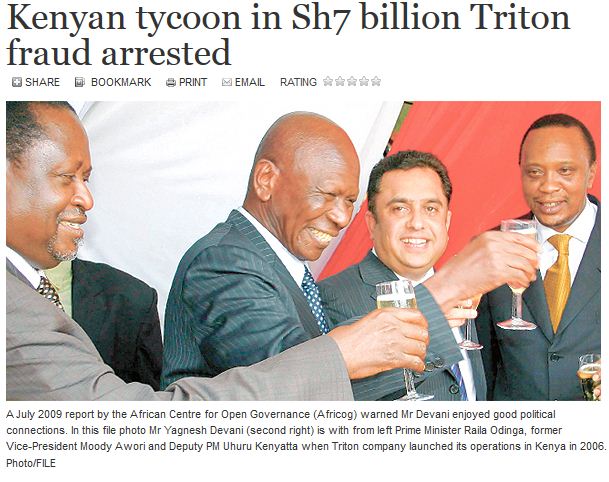The proprietor of Triton Petroleum Ltd Yagnesh Devani was arrested in London on Thursday.
“I can confirm that he was arrested earlier today and he has been remanded in custody,” the British High Commission in Kenya spokesperson, Mr John Bradshaw, said in Nairobi.
However, Mr Bradshaw said it was not yet known when the suspect would be extradited to face fraud charges.
“The court is yet to set the date for extradition hearing before he is brought back,” he said.
It is during that hearing that the formal request for extradition and all the supporting documents shall be put forward.
On Monday, a British minister assured the government that his country would hunt down Devani — the man behind the Sh7.6 billion Triton oil scandal — and extradite him to face justice in Kenya.
Earlier, the British minister asked the government to extradite Nambale MP Chris Okemo and former Kenya Power and Lighting Company boss Samuel Gichuru to the UK to face money-laundering charges.
Attorney General Amos Wako has submitted arrest warrants against Mr Okemo and Mr Gichuru to Chief Public Prosecutor Keriako Tobiko to start the extradition process.
Criminal procedure code
Mr Devani fled the country in 2009 following the Triton Oil scandal. The government sought the help of Interpol to track him down.
He had been charged in absentia for stealing Sh955,334,094 from Kenya Commercial Bank, and 26,216.60 tonnes of oil at the Kipevu storage facility in Mombasa valued at Sh1,532,272,140.
The criminal case against him was later withdrawn under Section 87 of the Criminal Procedure Code. This means the same charges can be brought against him again.
The scandal can be traced to 2008 when Triton Oil Company was allowed by Kenya Pipeline Company (KPC) to collect oil valued at Sh7.6 billion and sell it without permission of the financiers.
In the wake of the fuel shortage witnessed in 2008 and following complaints by oil marketers and financiers, KPC ordered an internal audit of oil stocks in its systems.
The audit revealed that stocks amounting to 126.4 million litres were irregularly released to Triton Petroleum Limited between November 2007 and November 2008.
Triton was not entitled to the stocks, nor did financiers authorise the release as required under contractual arrangements.
A July 2009 report by the African Centre for Open Governance (Africog) warned Mr Devani enjoyed good political connections.
“Triton’s executive chairman and managing director, Mr Yagnesh Mohanlal Devani has been described as a shrewd 43 year-old businessman who lives large and hobnobs with the high and mighty. A 2006 ceremony to open Triton’s LPG depot was attended by political bigwigs, including then Vice-President Moody Awori, several cabinet ministers, Hon. Raila Odinga, Hon. Uhuru Kenyatta, and several permanent secretaries,” Africog observed.
Mr Devani’s ties with the powers that be started during the Moi regime when Triton clinched the lucrative contract to supply petroleum products to the Kenya Power and Lighting Company several times.
Triton was also among the firms named in Parliament over allegations of money laundering. The firm is alleged to have received suspicious loans from Charterhouse Bank.
Mr Devani fled the country in 2009 and a warrant of his arrest issued.
Mr Devani was accused of stealing Sh2.7 billion from KCB.
The bank has also sued Triton for Sh2 billion for oil imports secured by the bank through debentures.
Several of his senior managers and workers including Mr Peter Kimathi, Mr William Mundia and Mr Sunil Somai were charged with criminal offences relating to the Sh7.6 billion oil scandal.
The directors, however, argued before court that they could not take plea on behalf of the company, and on Thursday a Nairobi court ruled that the three would not be facing criminal charges.
By PATRICK MAYOYO pmayoyo@ke.nationmedia.com and WALTER MENYA wmenya@ke.nationmedia.com
